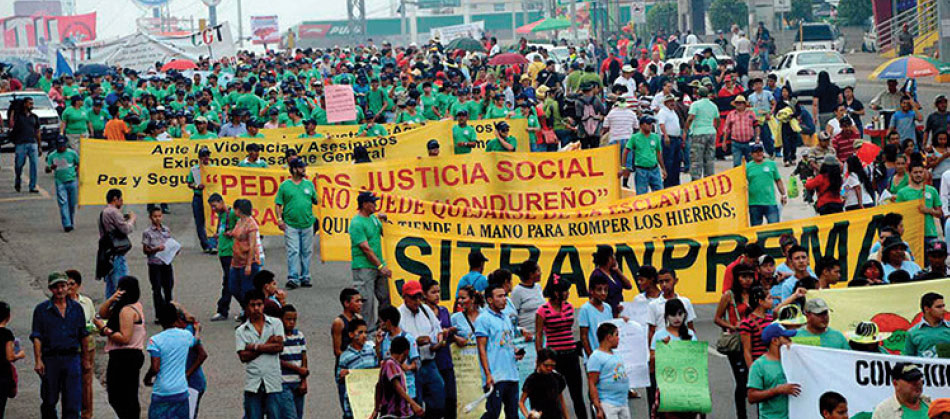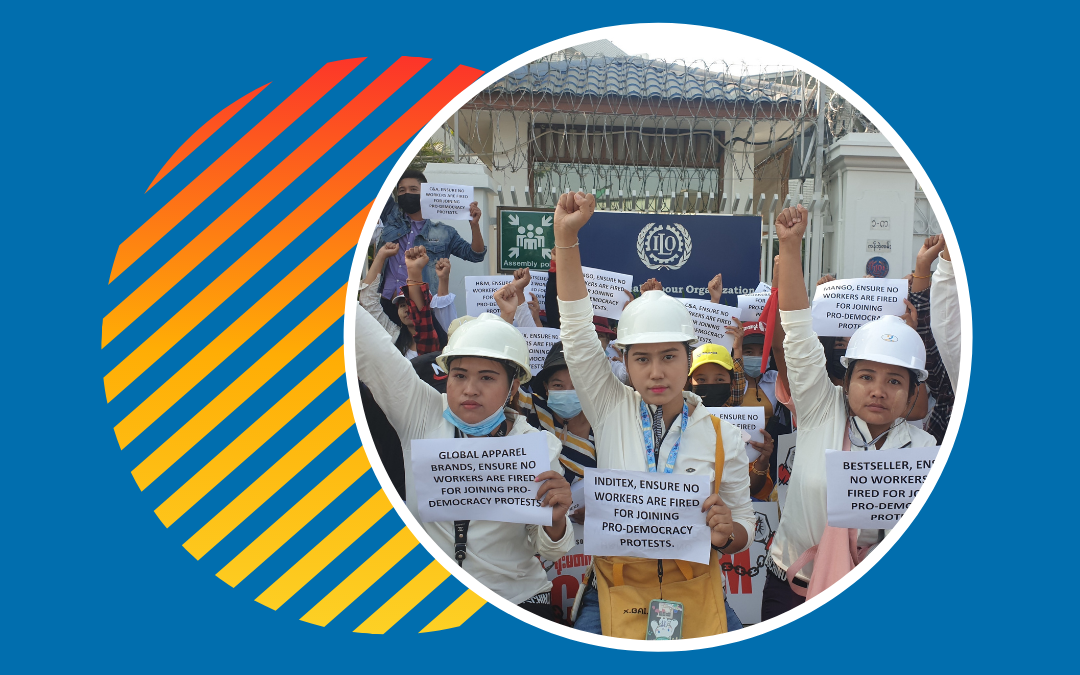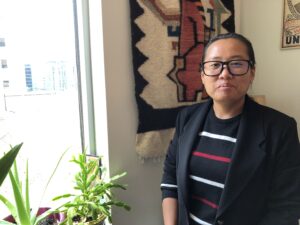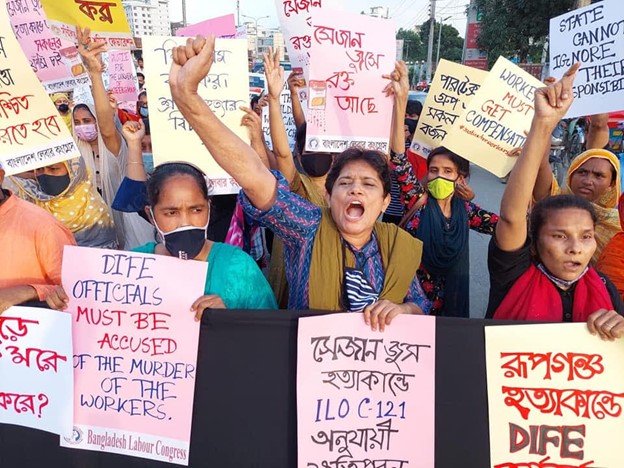
Jul 20, 2021
In Honduras, where union leaders are targeted with violence and even murdered for trying to form unions and improve workers’ lives, Darlin Oviedo, president of the apparel union SITRAJASPER (the Union of Workers of the Jasper Company), recognized the signs that he might be next.
In October, a motorcycle driver pulled alongside his motorcycle, staring at him with threatening glances, Oviedo told Solidarity Center, speaking through an interpreter. When he saw that the driver carried a high-powered weapon, he says he wove through traffic, trying to get away. The other driver followed him until Oviedo took cover at a shop. In the following months, Oviedo was followed two more times and, along with the employer’s attempts to undermine the maquila worker union he leads, Oviedo recognized he was not safe. He has since left his family for an undisclosed location.
“When people stand up to defend their rights and say there shouldn’t be any rights violations against workers, that’s when employers decide to mete out violence against union leaders like us,” Oviedo said. “I know that I lived through the first two attempts on my life but who’s to say there is not a third attempt coming at me.”
Oviedo says he and union general secretary, Selvin Peña, have been targeted since October, when workers rallied to demand the apparel factory bring back workers who wanted work after COVID-19 restrictions eased. Although the employer did call back the workers after the rally, Oviedo says the employer then began blaming all factory problems on the union, in what he says is retaliation for union success in improving worker rights on the job.
“Conditions were really difficult at the factory before the collective bargaining agreement,” says Oviedo. “But through the collective bargaining agreement, we won a really, really good contract, and that may be something the employer may not want to wholeheartedly support, so that is why they are going after the union.”
Workers Improve Job Safety with Solidarity
Forming a union at the Jasper garment factory was hard and took many years. Garment workers first created a union in 2006, but with workers facing constant employer harassment, including being fired for their participation, the union did not last. In 2016, 38 workers came together to rebuild the union and negotiate a collective bargaining agreement that covers some 2,440 workers.
Oviedo says among the many improvements, the contract restructured the occupational safety and health committee to focus on prevention, especially repetitive motion injuries that maquila workers frequently experience. The contract also ensures workers can speak up without retaliation when supervisors use abusive language, and it increased food and transport subsidies.
Oviedo took the lead in forming the new union. “When I first started at the factory, I noticed the production quota was so high, and demands so high for workers, I spoke up,” he says. “Because I spoke up about it, I was almost fired. Other workers felt the same. We started organizing quietly. They fired four of us and two of us won reinstatement.”
Challenging Anti-Union Violence
Oviedo has been active in the struggle to counteract anti-union violence since 2017, when he contacted Network Against Anti-Union Violence about physical assaults on two SITRAJASPER members and the murder of Roger Vásquez, a leader of another maquila union, SITRAGENESIS. The men were attacked as union activists participated in pro-democracy rallies in Choloma, in the Cortés department, after the presidential election.
He joined the Network’s national coordinating team and in May, the Network recognized him with an award for his union contributions and for his efforts to defend working people who have been victims of anti-union violence. Jorge Hernández at the Network Against Anti-Union Violence, honored Oviedo, and said Oviedo and his union sisters and brothers in SITRAJASPER, face “acts of intimidation and threats because of their struggle to build a more just society.”
In 2019, two union leaders in Honduras were murdered and dozens more physically attacked, threatened and harassed for their activism in advocating worker rights, according to the Network, which releases an annual report documenting harassment, retaliation and attacks against workers for their union leadership. (Read the 2020 report in Spanish.)
Despite all he is facing, Oviedo says worker victories give him hope. He cites an incident when the employer sent everyone home due to supply shortages forcing workers to use vacation time.
“We weren’t asking for vacation and that’s against the law to make us assume the cost of the business loss,” he said. “Because we were organized, we won back pay for some of the days we were home. That was a really inspiring moment for us—we saw that because we were organized we could win our rights.”
Holding Governments Accountable
Addressing anti-union violence means ensuring decent work and public safety, Oviedo says. “Economic inequality continues to widen for as long as these union campaigns are violently repressed, driving people to flee.”
The AFL-CIO is urging creation of a Central American regional migration framework that “centers on human rights, protects and empowers workers, safeguards the environment, and produces positive labor market outcomes for all working people.”
Further, the federation proposes aggressively enforcing labor standards under the U.S.-Central America Free Trade Agreement (CAFTA), and reopening CAFTA negotiations to improve and update its labor standards and enforcement mechanisms to align with the higher standard set under the U.S.-Mexico-Canada Trade Agreement.
“Right now we’re living through a moment of a lot of tension between workers and the company,” says Oviedo. “We must stand up to them because it’s our right. I have had to relocate to maintain my safety, but it is because it is our right to decent work.”
Jul 15, 2021
A hidden video-surveillance camera discovered on Monday was recording the entrance of the central office of the Confederation of Free Trade Unions of Ukraine (KVPU)—an act described by the organization as illegal and a possible attempt to interfere with trade union activity.
“The KVPU is deeply concerned about possible negative consequences for people, especially for activists and whistleblowers who visited our [Kyiv] office,” says KVPU Chairperson Mykhailo Volynets. Visiting diplomats and politicians may also have been illegally surveilled.
Describing the discovery as “alarming,” KVPU International Secretary Olesia Briazgunova says the organization is demanding a thorough police investigation and the opening of a criminal case.
“A lot of people come here to get legal assistance, discuss trade union activities or inform about corruption,” says Volynets, who fears for those helping KVPU prevent the adoption of draft laws that narrow worker rights in contradiction of international labor standards and those who are highlighting corruption in the coal industry and state-owned transport enterprises.
The recording of people without their consent, except in specific cases established by law, is prohibited by Article 307 of the Civil Code of Ukraine, says KVPU.

Jul 14, 2021
After the military overthrew Myanmar’s democratically elected government in February, the country’s garment workers, most of them young women, were the first to stand up to defend their right to a free and peaceful society. Since then, workers have led peaceful protests for a return to democracy—often met with violent repression, evictions, arrest warrants and prison.
Nearly 1,000 people have been killed and at least 5,000 arrested, most tortured in prison, forcing many workers and union leaders to flee. Because of their important role in standing for democracy, the government banned unions.

CTUM Assistant General Secretary Phyo Sandar Soe is standing with workers across Myanmar in a peaceful struggle for democracy. Credit: Solidarity Center/Tula Connell
In a special Solidarity Center summer podcast episode, host Shawna Bader-Blau, Solidarity Center executive director, talks with Phyo Sandar Soe, assistant general secretary of the Confederation of Trade Unions-Myanmar.
Speaking from a safe house, Sandar, a former garment worker, tells Bader-Blau that as multinationals begin to reopen in Myanmar, workers have no rights on the job without unions—including to be paid. The international community can truly help workers fighting for their rights by staying out of the country, she says. (Listen to the full interview.)
“If you invest in Myanmar, your investment money will go to the military regime,” Sandar says. “And then the military regime, with your money, they will keep controlling the country and they will buy guns and weapons, and then they will kill us.”
Like many union leaders, Sandar has her passport revoked to prevent them from leaving the country while they are being hunted by the regime. Despite the repression and personal danger, Sandar says when workers join together, they are strong.
“We are facing a bloody crackdown, but all people protect each other. We are finding solutions to fight back. That’s why I want to tell our brothers and sisters to endure this duration because we have very high motivation to fight back against the junta.”
Support Workers in Myanmar!
• Donate to a fund set up by the U.S.-based Asian Pacific American Labor Alliance. Your donation will go to those who have lost jobs and are struggling to survive because they stood up for a peaceful return to democracy. The link is available in the podcast notes for this episode.
• The International Trade Union Confederation is sponsoring a strike fund for workers in Myanmar.
Download Season One Episodes
The Solidarity Center Podcast, “Billions of Us, One Just Future,” highlights conversations with workers (and other smart people) worldwide shaping the workplace for the better.
Check out the full first season of The Solidarity Center Podcast and stay tuned for season two this fall!
This podcast was made possible by the Ford Foundation and the generous support of the American people through the U.S. Agency for International Development (USAID) under Cooperative Agreement No.AID-OAA-L-16-00001 and the opinions expressed herein are those of the participant(s) and do not necessarily reflect the views of USAID/USG.

Jul 14, 2021
Worker rights advocates and the international human rights community are expressing sorrow, disbelief and outrage over the horrific fire at the Hashem Foods Ltd., factory in Bangladesh that killed at least 52 workers and more than a dozen children early this week. News reports say factory exits were locked, trapping the 200 workers inside. Three workers died jumping from the burning building.
“We believe that the fire has occurred as a result of non-compliance with law and safety regulations of the institution. This amounts to murder committed by the factory,” three major union federations said in a statement. Chemicals and flammable substances like polythene and clarified butter contributed to the blaze in the factory, and made it more difficult to bring under control, according to CNN.
The Bangladesh Garments and Industrial Workers Federation (BGIWF), Bangladesh Independent Garment Workers Union Federation (BIGUF) and Bangladesh Center for Workers Solidarity (BCWS) went on to call on the government to immediately investigate the cause of the fire and to provide fair compensation to those injured and to the families of those killed.
The owner and several top officials at the factory, owned by Bangladeshi conglomerate Sajeeb Group’s subsidiary Hashem Foods Ltd., have been arrested on murder charges. Some 2,035 people work in 11 factory buildings of Hashem Foods, which produces juice drinks, cookies and other snacks.
The fire amounts to “premeditated murder,” says Nahidul Hasan Nayan, general secretary of the Sommilito Garments Sramik Federation (SGSF). “Workers whose sweat has built palaces lost their lives due to the greed of owners, their lack of accountability, irresponsibility, brutality and lack of safety at work. We demand the culprits to be brought to swift justice.”
Bangladesh Accord Must Be Renewed
Worker rights advocates say the Hashem factory fire highlights the need for multinational brands to renew the Accord on Fire and Building Safety in Bangladesh, a landmark agreement that made factories safer for 2 million garment workers. Signed by fashion brands and unions in 2013, the Accord was set apart from previous safety agreements because it was legally binding, providing a key enforcement mechanism for workers and their unions to hold individual brands and retailers accountable.
The Accord was set to expire May 31, but corporate brands agreed to a three-month extension to allow for more time to conclude negotiations on a new binding safety agreement. Global union leaders and human rights activists say the Accord must also be expanded beyond fashion brands.
“While huge strides have been made in the garment industry safety—thanks to the Bangladesh Accord—it is a reminder that without robust and independent systems to enforce safe working conditions, the very worst can happen,” says UNI Global Union General Secretary Christy Hoffman.
Workers say that through their unions, they are able to advocate for safe working conditions without fear of being disciplined or even fired. As with the 2013 Rana Plaza collapse, that killed more than 1,100 garment workers, and the 2012 Tazreen factory fire that killed more than 112 garment workers, those at the Hashem Foods factory did not have a union to help them fight for a safe workplace or ensure children were not employed.
Says Chandon Kumar, BIGUF president: “Government agencies create investigation committees just for show. How come they did not see child labor and insufficient fire protection? We must have the right to form unions, democratic process and the freedom to speak up.”
Jul 7, 2021
Legal experts supported by Solidarity Center partner Labor Initiatives (LI), an organization representing and advancing worker rights in Ukraine, contributed recommendations that were incorporated into the country’s latest National Human Rights Strategy. The 2021–2023 strategy—a legally binding document to be implemented by state authorities in accordance with United Nations International Standards and Principals and Ukraine’s Association Agreement with the European Union—was signed into force by President Volodymyr Zelensky earlier this year.
Up to 100 action points are listed in the new strategy, including several advanced by LI lawyers Inna Kudinska, George Sandul, Katia Shvets and Nadia Yolkina in sections on freedom of association, worker rights, social protections, business and human rights, and anti-discrimination.
“The increasing significance of the LI team’s expertise is reinforcing its ability to make workers’ voices heard,” says Solidarity Center Ukraine Country Program Director Stanislaw Cieniuch.
Action points successfully advanced by LI to promote gender equality include: 1) Ratification of Convention 190, a new global International Labor Organization (ILO) treaty to prevent and address violence and harassment in the world of work that includes gender-based violence and harassment; 2) Amendment of the national labor code on equal pay and reduction of the gender pay gap; and 3) Development of national policies to shift the burden of proof in discrimination cases—including gender-based cases—from the employee to the employer.
LI’s lawyers also advanced action points for amending the country’s law on collective labor disputes, including ways to improve dispute resolution procedures and remove bureaucratic barriers preventing workers from exercising their right to strike.
“Labor is the defining part of life for every person,” reports LI. “[S]trong labor rights protections and rule of law are core safeguards to avoid catastrophic consequences for the people of Ukraine.”
Ukraine’s National Human Rights Strategy—first developed in cooperation with international organizations and civil society in 2015—is intended to develop a document that outlines citizens’ legal protections and to unite society around a common understanding of the value of human rights and freedoms to be protected equally and without discrimination.

Jun 23, 2021
LGBTQ workers in Southeastern Europe face daunting barriers to attaining equality and safety on the job, among them exclusion, discrimination in obtaining employment, harassment and violence on the job, and poverty.
In the region, two-thirds of workers who identify as LGBTQ hide their identity due to fear of losing their job, fear of alienation and discrimination from other colleagues, fear of violence and fear of exploitation, according to research by LGBTQ Equal Rights Association for Western Balkans and Turkey (ERA), an umbrella organization for more than 60 LGBTQ groups in the region. ERA also reports that 16 percent of workers surveyed have experienced unfair treatment with respect to employment conditions, and 41 percent of workers have witnessed negative conduct toward their colleagues who identify as LGBTQ.
“This is where unions come in. These are workers who are being harassed simply for showing up and doing their job. That is definitely a trade union issue,” says Steven McCloud, country program director for Albania, Bosnia and Herzegovina, Montenegro and Serbia.
This year, the Solidarity Center launched a program with Southeast Europe regional trade union network Solidarnost, participating unions in Albania, Bosnia and Herzegovina, Montenegro and Serbia, and Pride at Work, which represents LGBTQ union members in the United States, to take on LGBTQ worker issues and build solidarity by addressing LGBTQ discrimination and harassment at work as part of larger efforts tied to improving occupational safety and health and eradicating gender-based violence and harassment on the job. The program focuses on the intersection of LGBTQ rights with workers’ rights to safe and healthy workplaces free from violence and harassment.
Countries in Southeastern Europe have some laws that protect LGBTQ people from basic discrimination. However, the struggle often lies in creating a safe space where LGBTQ workers who experience discrimination can come forward, exercise their rights and be supported, McCloud says.
“This can be done through promoting practices that strengthen their visibility, representation and capacity in trade unions in those countries,” says McCloud. “LGBTQ rights are worker rights, and unions need to ensure that LGBTQ workers are meaningfully included and represented.”





